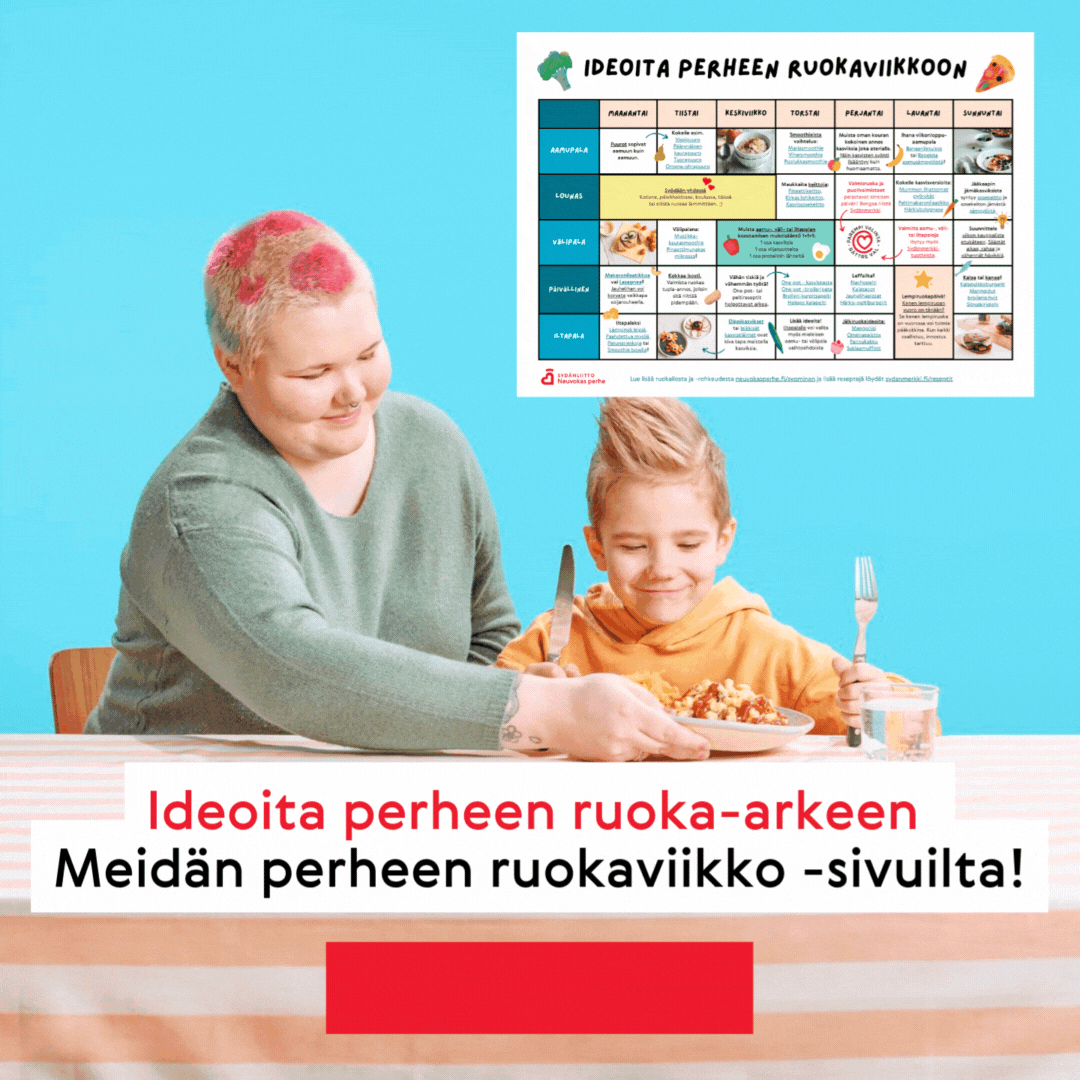Diet during pregnancy
A varied diet protects the expectant mother’s well-being and the growth and development of the child.
Before pregnancy
Planning for pregnancy and the pregnancy itself often make you aware of the eating habits and lifestyle of the whole family. During the first trimester, the nutrition and growth of the foetus depend largely on the mother’s nutrition before pregnancy. Therefore, you should consider the quality of your nutrition already when planning for pregnancy. At that point, the diet recommended for the whole family is suitable.
Those planning for pregnancy should also start taking 400 microgrammes of folic acid daily approximately two months before discontinuing contraception and throughout the entire first trimester. The expectant mother needs a sufficient level of folate in her body, as this will affect the development of the embryo right from the first weeks of pregnancy.
Healthy food choices during pregnancy
The need for several nutrients increases during pregnancy, but the need for extra calories is quite low. The expectant mother doesn’t have to eat for two people. In practice, you should eat more foods containing plenty of protective nutrients but little calories. All berries, fruit and vegetables, wholegrains, vegetable oils, fat-free dairy products, fish and low-fat meat are highly recommended. When following a regular eating pattern (breakfast, lunch, snack, dinner, evening snack) and the recommended food plate model, you can have more energy and choose healthier foods. The Heart Symbol helps you to find healthy, varied foods in the supermarket. With the Smart Family card you can assess your own eating habits.
Everyone will find their own way of healthy eating. A vegetarian diet is equally suitable for pregnant women. A vegan diet is also safe when compiled correctly. You can ask help from a dietician, if necessary. A healthy diet during pregnancy will help you recover from the delivery and support successful breastfeeding.
- Eat 5–6 portions of vegetables, berries and fruit daily. Eat vegetables at every meal and use them diversely (as they are, in salads and as part of cooking; remember pulses). Vegetables, berries and fruit are the foundation of your diet and contain fibre, folic acid and iron, among other things.
- When eating bread and porridge, favour fibre-rich wholegrains. Wholegrains are important sources of iron, folic acid and fibre and prevent constipation.
- Use enough unsaturated fats daily. Use plenty of vegetable oils in cooking and in salads. Rapeseed oil and olive oil are good options. Spread margarine on bread to get essential fatty acids.
- Eat fish 2–3 times a week, changing fish species. Fish contains good fats but also iodine and iron.
- Eat 5–6 decilitres of dairy products daily. Favour fat-free and liquid dairy products. Dairy products are a good source of calcium, vitamin D and iodine.
Food supplements during pregnancy
Vitamin D supplement (10 microgrammes daily) is recommended for all expectant mothers all year round.
Folic acid (400 microgrammes daily) is recommended for all women planning for pregnancy. It should be started two months before discontinuing contraception and continued throughout the first trimester.
The need for calcium, iron and iodine supplements will be assessed individually. A calcium supplement may be needed during pregnancy if the diet contains little or no dairy products. The need for an iron supplement can be assessed at the maternity clinic by checking the blood haemoglobin count. The haemoglobin count decreases during pregnancy due to the increase in blood volume. You should check you’re getting enough iodine during pregnancy.
If your diet is not adequately varied, you can take multivitamin and mineral products. Vitamin A supplements, fish liver oil and overlapping products should be avoided. The need for multivitamin and mineral products should be assessed with the maternity clinic staff.
Restrictions during pregnancy
Alcohol is not recommended during pregnancy. The limit of safe use is not known.
The directions and restrictions on the safe use of foodstuffs are updated on the website of the Finnish Food Safety Authority. Some of the restrictions are based on known harmful effects, whereas some foodstuffs have been prohibited or restricted during pregnancy as a precaution.
Gaining weight during pregnancy
You should gain weight during pregnancy. The amount of weight gain depends on the mother’s weight before pregnancy. You can discuss your appropriate weight gain with a public health nurse at the maternity clinic. It is important that underweight and very young women gain enough weight during pregnancy, because too low weight gain may slow down foetal development. Expectant mothers who are overweight, however, are at increased risk of disorders such as gestational diabetes. Gaining a lot of weight during pregnancy may pose the risk of more permanent overweight, because around 50% of overweight women started gaining weight during pregnancy.
Even minor changes in diet and exercise help prevent too much weight gain during pregnancy and promote healthy habits even after pregnancy.
Pregnancy sickness
Pregnancy sickness typically occurs in the morning, when the previous meal was a long time ago. Sickness can be prevented by eating several small meals during the day. Cold drinks and foods as well as fruit and vegetables may feel fresh and alleviate nausea. Some women have nausea throughout the day and may feel bad for several weeks. If pregnancy sickness makes normal eating harder, it is important to find foods and drinks that you like. When pregnancy sickness finally subsides, you will have more energy to assess your eating habits, eating patterns and food choices if they have been restricted during nausea.
See also:
The Smart Family card to assess your eating and exercise habits
Exercise during pregnancy and breastfeeding (in Finnish)
Recipes and information about the Heart Symbol products
Finnish Food Authority: Instructions and restrictions on the safe use of foodstuffs
Eating together – food recommendations for families with children
